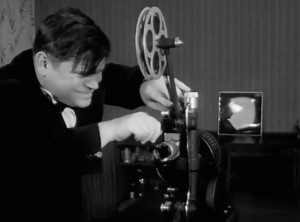
"Stop the Projector, I Want To Get Off features James Weatherburn as the bumbling projectionist who is trying to learn how to run one of the fool contraptions. His attempts are not quite all-out comedy, yet his antics are amusing, and anyone who remembers the day he first tried to run one of these complicated machines will be amused at someone else's interpretation of what the sensation is like" PSA Journal, Sept. 1966, 35.
"The Wayward Mink. It is hard to believe, but the plot in this film is exactly the same as in The Boomerang, made by filmers in Montreal. Were it a simple, everyday plot, the coincidence would not be so remarkable, but these two filming groups are over 3000 miles apart. In the Mink as in the Boomerang, a wayward wife accepts a gift from her lover, only this time it is a mink stole instead of Boomerang's necklace. Again, the wife wonders how she can get her husband to "find" it and, she hopes, present it to her. And, to top it all off, what eventually happens to the wayward mink also happens to the necklace. Though the plots are identical, the treatments are entirely different" PSA Journal, Sept. 1966, 36.
"A rather thorough glimpse of the little town of Salzburg, Austria, is given to us in this well constructed little film. We find music, distinctive dress, churches, parks, and people. The narrator and the sound track go a long way towards amplifying the mood that is created by the visuals" PSA Journal, Sept. 1966, 36.
"Gold for the excellent trick work in its dream sequence in which a young boy imagines, in a neatly feathered "balloon" above his head, the adventures he is about to have in the forest" PSA Journal, Sept. 1966, 36.
"The Beasts Shall Inherit the Earth for the excellently made props in the form of creatures that appear in the film from time to time to drive out the populace and take over for themselves. Many times these props look genuinely alive" PSA Journal, Sept. 1966, 36.
"Busk'n [was awarded] for its very excellent black-and-white photography" PSA Journal, Sept. 1966, 36.
"Dr. Karl von Frisch performs some of the experiments which led to his discovery of the language of the bees. Explains the system by which bees communicate information about direction and distance. Emphasizes the importance of curiosity in scientific research." via WorldCat
Total Pages: 299